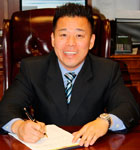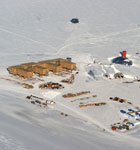At a Glance
Location
Hialeah, FL
Founded
1992
Employees
25
Specialty
Structural-steel work for buildings and renovations
To hear Doug Kuiper tell it, there isn’t much to the story of his founding of Suncor, Inc. Fabricators in 1992: he’d been in the steel fabrication business for nearly two decades, and he’d worked for three different businesses before deciding to make an entrepreneurial move of his own. However, since Suncor is still going strong another 20 years later, there’s clearly a lot more to be discussed than Kuiper’s letting on, including a focus on customer care and considerate financial planning.
One of the bigger factors in Suncor’s success is its repeat customer base, which Kuiper sees as a clear consequence of his company’s focus on client satisfaction. Suncor continues to serve most of its original early-1990s clientele, save for those who have been forced to close in recent years, and it’s this kind of loyalty that has kept the company afloat during the rough economic waters of late.
Suncor is capable of providing steel for projects in just about any sector—and it continues to broadens its abilities—but the majority of its work comes from renovation, education, and government projects, the latter of which it tackles with particular enthusiasm because of the construction companies it gets to work with. “In my opinion, there’s a higher caliber of contractor that works on government-related projects,” Kuiper says. “When you’re dealing with paperwork and bonding requirements, you’re dealing with a higher-level contractor.”
One such contractor is the southeast regional office of Suffolk Construction Company Inc., with whom Suncor has done dozens of projects—from movie theaters to medical buildings, from schools to assisted-living facilities—since the mid-1990s. So, when Suffolk recently needed design assistance with a major sports facility, Suncor was quickly brought on board with a $2.5 million contract to provide structural steel and miscellaneous metals services. The result is the Camp Lejeune Physical Fitness Center, built on a military base in Jacksonville, North Carolina, and one of 19 new structures—comprising nearly 570,000 square feet—on the base.
Like most facilities of its kind, the fitness center required long-span roof framing to keep the playing areas from being broken up by columns. “Originally it was a very heavy structural truss system planned for the roof over the gym,” Kuiper says. “There’s different ways of designing framing systems, and some are more efficient systems than others. We got together with Suffolk and threw ideas back and forth. We experimented with several ideas and ultimately changed the heavy trusses to a steel-joist system, manufactured by New Millennium Building Systems. So we were part of the effort to shorten the lead times for the fabricated materials.”
In fact, the effort went beyond the framing system. “We also changed the metal deck that goes up after the trusses and joists,” Kuiper adds. “Most of the acoustical roof deck was changed to standard metal deck to speed up the delivery and installation process.”
Given that Suncor itself is run on economic principles that include never financing anything and only expanding as fast as cash flow allows, it makes sense that the company would also be concerned with cost efficiency for its clients. For another project, for instance, a K–8 prototype school located in St. Lucie County, Florida, Suncor met with all parties involved and conducted value-engineering scenarios. Ultimately, the composite framing system for the floors was changed to a steel-joist and form-deck system, resulting in what Kuiper calls a “win-win” for all parties.
Suncor went on to build several more similar projects for the same customer, and to Kuiper such efforts are just another page in Suncor’s story of constant growth. “That’s just what you do,” he says, “when you dig into a job and see where the potential savings could be.” ABQ


